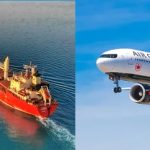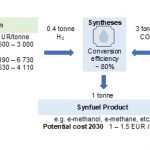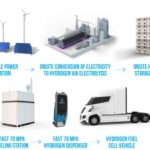The EU’s fertiliser industry must face up to the region’s ambitious decarbonisation rules, making its carbon-intensive processes much more costly. But a door of opportunity is also being opened: the industry already produces ammonia which is increasingly being seen as an alternative clean fuel, explains Hyung-Ja de Zeeuw at Rabobank. The problem for EU nations is that it will be cheaper for the industry to relocate and make that ammonia somewhere … [Read more...]
16 innovative firms driving Aviation’s transition to net-zero
The Sustainable Aviation Challenge has identified 16 innovative firms that can accelerate the development and adoption of sustainable aviation fuel and other propulsion solutions. Aviation accounts for 2% of global emissions and, so long as lightweight compact clean aviation fuels are unavailable, this number is likely to increase along with air travel projections. Gianluca Gygax at the World Economic Forum lists the 16 firms, who will now be … [Read more...]
Making solid fuel from captured CO2 (with a 96% conversion rate)
What if CO2 could be captured and, rather than locked away underground for eternity, turned into a stable powder that can be used in fuel cells to produce electricity? David Chandler at MIT describes research there and at Harvard that has demonstrated a new process that has a 96% conversion rate. It’s been tried before, but the conversion rates were an unusable 20%. The CO2 is converted into formate and used like hydrogen or methanol (both strong … [Read more...]
Green Methanol: an alternative fuel for heavy vehicles and shipping?
It’s very early days but pilot projects for green methanol are underway, explains Gabi Thesing writing for WEF. It’s a low-carbon fuel that can be produced from renewable sources such as biomass or using carbon capture. Compared to traditional fossil fuels it can reduce CO2 emissions by 60-95%, nitrogen oxide by 60-80%, and almost completely eliminate sulphur oxide and particulate matter emissions. Green methanol can be blended with traditional … [Read more...]
Modelling green Ammonia and Methanol in 2050. It will be expensive
Schalk Cloete starts by explaining that it is unrealistic to expect clean electrification to carry the main burden of energy supply. Even a fast roll out will be constrained by a range of infrastructure and cost limitations. Hence our continued dependence on fuels, with their high energy density and ease of transport. Those fuels will have to be made clean, so he summarises his co-authored papers that model the cost of green and blue ammonia and … [Read more...]
Converting captured CO2 directly into fuels could get simpler, cheaper
Converting captured CO2 directly into fuels (or other products) at scale seems an effective way to mitigate emissions. But most of the conversion methods, including electrochemical, thermocatalytic, photothermal, or photochemical processes, have not proved very effective. David Chandler at MIT describes how researchers there have identified the main stumbling block and found a very simple solution. Basically, at the molecular level, the contact … [Read more...]
Green hydrogen-based fuels pivotal in decarbonising Shipping by 2050
The international shipping sector’s emission levels are comparable to Germany’s. Like aviation and heavy transport, reaching net-zero will need renewable fuels – direct electrification won’t be sufficient. Existing fossil fuel engines allow for biofuel blends of up to 20% without any modifications, and 100% methanol engines are a proven technology. Making sufficient quantities of clean fuels - without consuming food crops – is the challenge. … [Read more...]
Aviation and Shipping emissions: will Biden take on the challenge?
William Todts at Transport & Environment is very worried about the Biden administration’s approach to aviation and shipping emissions. The signals are that the U.S. wants to work through the International Civil Aviation Organization (ICAO) and the International Maritime Organization (IMO). But they have neither the ability nor the means to spur technological breakthroughs. That matters, because it’s only the use of alternative fuels that can … [Read more...]
What effect will blending Hydrogen into the Natural Gas network have?
What are the technical barriers to blending hydrogen into the natural gas network? How well will the pipelines cope? How will the blend affect equipment and appliances? What are the costs and environmental impacts? The answers to these key questions are being sought by a collaboration of laboratories, industry and academia led by NREL, called HyBlend. The long-term impact of hydrogen on materials and equipment is still not understood. The effect … [Read more...]
Green Ammonia can replace fossil fuel storage at scale
What’s the best way to store energy, from industry scale to electric vehicles, replacing the widespread use of fossil fuels? Pure hydrogen is an energy dense alternative, but the gas takes up a lot of space. Liquid ammonia doesn’t, yet it contains the hydrogen and therefore the energy. Ian Wilkinson at Siemens explains the advantages of using ammonia, NH3. Already the world produces 180m tonnes a year, worth €80bn. It’s mainly for agricultural … [Read more...]
The outlook for Powerfuels in aviation, shipping
The development and commercialisation of powerfuels is in its very early stages. Powerfuels are synthetic gaseous and liquid fuels produced from green electricity. The plan is to use them when there is no viable alternative, like aviation and shipping. The big hurdle is cost, currently in the range of €3-5/litre, or five to ten times the price of fossil fuels. Dolf Gielen and Gabriel Castellanos at IRENA and Kilian Crone at the German Energy … [Read more...]
Biofuels: slump in investment and innovations must be reversed
IRENA is predicting the future of liquid biofuels by monitoring the number and technology-type of patents. It’s not looking good. The first thing to note is that, after a promising rise, the total number of patents has slid from over 6,000 in 2011 to around 2,500 in 2017. That’s reflected in the dramatic fall in global biofuel investments, from $27bn in 2007 to $2bn in 2017. The likely main cause is a lack of stable regulation, say Alessandra … [Read more...]
Hydrogen Fuel Cell trucks can decarbonise heavy transport
Patrick Molloy at Rocky Mountain Institute runs through the pros and cons of hydrogen fuel cell vehicles (FCEVs). The big pluses are that hydrogen has an energy density of around 120 MJ/kg, almost three times more than diesel or gasoline. Half the energy generated by an internal combustion engine is wasted as heat, whereas electric drivetrains used by FCEVs only lose 10%. Nikola Motors, a U.S. maker of hydrogen trucks, claims its vehicles can get … [Read more...]
Alternative fuels: Europe’s infrastructure struggling to keep pace
When it comes to the promotion of electric and hydrogen vehicles, Europe is struggling to match policymakers’ utopian rhetoric. The technology from the likes of ABB and Schneider Electric is ready but much more needs to be done for both hydrogen fuelling and EV charging infrastructure. Gaurav Sharma spoke to some of the industry leading lights at CERAWeek. … [Read more...]















